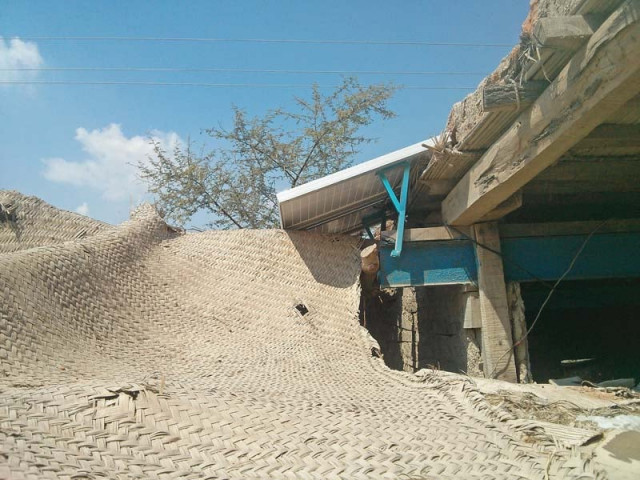In Sindh, a smiling Mother Nature does the trick where government fails
Eco Energy providing solar energy solutions to electricity-starved rural areas.

Dost Ali Shoro, a small business owner, has installed a solar panel on the top of a thatched roof . PHOTO: BILAL MEMON/EXPRESS
City dwellers cannot imagine life without electricity. Maybe, in Pakistan, they still can. At least, they know what it is like to have it and lose it. But, in no way, a comparison can be drawn with Sindh’s rural areas that present a sorry state in terms of infrastructure, literacy level and health facilities. Residents of most villages can see power lines run across the sky but, electricity remains an unachievable dream.
The government, economic managers and even think tanks will talk about economic development. Election candidates will promise basic necessities as they lure rural residents into their vote bank. But, a long-term, sustainable path to progress, taken through steps of spreading education and infrastructure, seems too long for a government not looking beyond its term of five years – which in most cases is actually less.
Where governments fail, private and social enterprises look to fill the void, sensing an opportunity to either make money or spread some goodwill along the way.
Eco Energy Finance, a social enterprise, is looking to meet that need through solar energy solutions, including solar lanterns – replacing the traditional lanterns run by kerosene – at a cost of Rs1,000. With the average monthly household income in Sindh’s rural areas hovering around the Rs15,000 mark, according to the Pakistan Bureau of Statistics, and a family that could go beyond 10 members, a Rs1,000 solar lantern proves beyond reach given cheaper alternatives are available. Here is where Eco Energy is looking to counter competition – providing installment packages to customers to increase affordability and sales.
Around 70 million people lack access to the national grid with Sindh contributing its share to the unwanted statistic. Jeremy Higgs, co-founder and chief operating officer at Eco Energy, says there is a definite need for such solutions.
“We surveyed a shade under 2,000 villages and found that 80% of them have nine hours or less of electricity – around 35% of them are completely cut off from the national grid,” Higgs told The Express Tribune. “So, there is definitely a need.”
Products are diversified and include solar lanterns to a solar panel that can generate 50 watts of electricity that meets basic needs. A visit to the Sujawal district revealed that small business owners, including small eateries that offer tea and cookies only, have installed solar panels that cost them Rs3,000 per month. Those 50W are enough to power a small television, a fan and a small bulb – not more. But, this is an investment that lures residents who look towards it as a recreational activity – for them it is a luxury to be able to watch a live cricket match.
“We are not booking profits at the moment. The profit margin on solar lanterns is not high at all. It is the solar panels that enable us to make some amount of money,” said Higgs.
With 70% of its sales recorded on credit, it will be a while for Eco Energy to make money. Higgs said the entity is a social enterprise, “looking to make enough money to sustain its mission of making affordable clean energy accessible to the energy-poor of Pakistan”.
“We’ve also enabled mobile payments as a part of our collection system. Now, our distribution network charges customer and ‘fills credit’ in their solar lanterns through a mobile app.”
With financial inclusion a relatively unknown concept for rural Pakistan, mobile payment is an easier collection method.
Concentrating mostly in the southern part of Sindh, spreading its reach through distribution agents in various districts, Eco Energy is still gaining ground.
“We are in talks with the Sindh energy department and microfinance banks to facilitate the growth of our business as well as meet electricity needs of more people.”
THE WRITER IS A STAFF CORRESPONDENT
Published in The Express Tribune, March 9th, 2015.
Like Business on Facebook, follow @TribuneBiz on Twitter to stay informed and join in the conversation.


















COMMENTS
Comments are moderated and generally will be posted if they are on-topic and not abusive.
For more information, please see our Comments FAQ